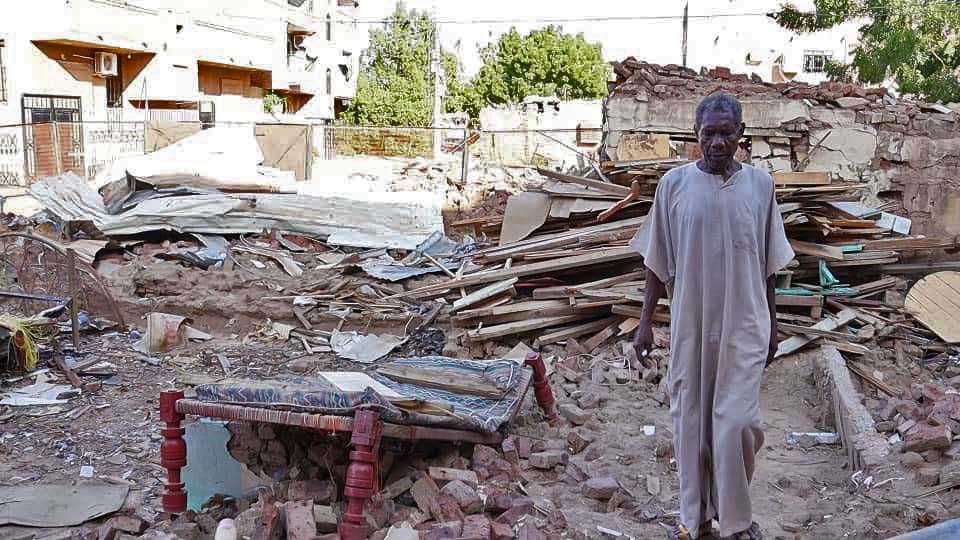More than 100 killed as airstrikes intensify in Sudan capital

Homes and shops in Burri in Khartoum destroyed by bombing, October 6, 2023 (File photo: Saeed Abdelmajeed)
The Sudan Armed Forces (SAF) stepped up its military operations in the capital, Khartoum, marked by increased aerial bombardments over the past three days. Airstrikes caused more than 100 civilian casualties and damaged and destroyed of public and private facilities. In response, the Rapid Support Forces (RSF) have reciprocated by shelling army sites.
On Wednesday, SAF warplanes bombed the Kandahar livestock market and residential block 17 of the large neighbourhood of Dar El Salam, inhabited by people displaced in former wars. At least 97 people were killed.
In a press statement yesterday, the resistance committees of Dar El Salam labelled the bombing of the market and the nearby housing block a “war crime” and “genocide” against residents of the area. A court building, and the police department of central Omdurman, have also severely been damaged by the airstrikes of the past few days.
The RSF has imposed a siege on Dar El Salam. People who have not fled the neighbourhood are suffering from both artillery shelling from the paramilitary force and aerial attacks by the SAF.
In southern Khartoum, a family of seven was killed in an airstrike on El Nahda (formerly Ingaz) neighbourhood. In central Khartoum, the Byblos Bank Tower was bombed, damaging its infrastructure. Houses in Burri, El Jereif Gharib, El Ta’if, and Arkoweet in Khartoum, and in several neighbourhoods in Sharg El Nil in Khartoum North were also damaged.
Sudan’s Emergency Lawyers accused the SAF and the RSF in a statement on Wednesday evening of “continuing to violate international humanitarian law” by carrying out air and artillery attacks targeting civilians and infrastructure, pointing out that army attacks on RSF targets in greater Khartoum “significantly expanded”.
Aerial bombardments targeted El Jeili petrol refinery, north of Khartoum North, for the second time this week.
The lawyers further noted that the RSF continued their “indiscriminate shelling” of areas surrounding the SAF General Command in central Khartoum and the Signal Corps in the southern part of Khartoum North.
North Kordofan
SAF airstrikes on Jebrat El Sheikh in North Kordofan on Wednesday afternoon killed four people. 14 others, including five children, were wounded.
Radio Dabanga sources in the area reported the incident, noting a simultaneous cut in the communications network.
The Sudanese air force carried out another aerial bombardment Zaeema in North Kordofan, on an airstrip and a mining site controlled by the RSF the areas of Hamra and Abu Zaeema.
Escalation
Radio Dabanga spoke with Brig Gen Kamal Ismail (Retd), head of the Retired and Arbitrarily Dismissed Officers Association, to discuss the reasons and feasibility of the ongoing military escalation.
Ismail emphasised that “in this war, neither party is a winner, everyone is losing, and the Sudanese people suffer the most”. He deemed the escalation unjustified, asserting that the conflict cannot be resolved militarily and necessitates negotiation.
Concerned about the aftermath of the failed Jeddah negotiations, Ismail said it led to frustration among the Sudanese and is “paving the way for new disasters”. He added that “people aligning with either the SAF or the RSF will contribute to the destruction of the nation and its social structures.”
Ismail predicted that the continued escalation will inevitably cause polarisation within the country. “Depending on external supplies is an unacceptable form of polarisation, which will impact the Sudanese people most”, he added.
The retired brigadier pointed fingers at certain parties he accused of instigating war, “particularly these parties with known links to the Muslim Brotherhood, responsible for havoc, murder, and displacement in Sudan for three decades.
“They are now seeking a return to power with the same destructive practices,” he said, attributing the current military escalation to their incitement and lack of awareness.
Ismail urged the warring parties to heed the voice of reason and bring an end to the war “today before tomorrow.”








 and then
and then